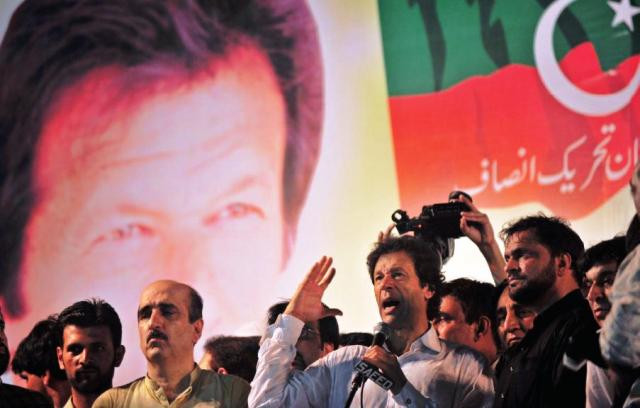Time to move on Khan!
Will goodwill for Imran Khan’s mission fade under his seemingly arrogant, self-righteous confrontationist approach?

PHOTO: AFP
Regardless of the outcomes of the recent by-elections in Punjab, the PTI’s Pakistan-origin supporters and sympathisers abroad have begun asking the aforementioned questions. In numerous conversations in the Americas, Europe and Japan, between July and now with these Pakistanis, one could discern their frustration with Khan’s post-dharna ranting — as if they see him squandering the chance to change Pakistan.
Imran labels Nawaz as 'most corrupt in Pakistan'
Why this visible craving for a better Pakistan? Because the societies these expatriates live in are primarily defined by the secular model of governance comprising fundamental ingredients of equal citizenry, the rule of law and merit. This governance regime, which largely treats every citizen indiscriminately — regardless of caste, creed, colour or social status — naturally evokes a strong desire of change back home. And beyond doubt, Imran Khan’s PTI has for some time served as that beacon of hope for a better Pakistan.
But the fascination with Khan’s ‘revolutionary’ agenda is in many cases now giving way to a sense of despondency because of the PTI chairman’s hitherto fixation on the ‘2013 electoral fraud’. “How can a few favourable results turn the fate of Pakistan?” asked a wealthy car dealer in Tokyo. “Will Khan ever move away from his rhetoric on elections and political rivals?” asked another Pakistani settled in Geneva. Both have been quietly funding the party, probably fired by a passion to see a different Pakistan.
NA-122 by-election: Imran Khan dares premier to a face-off
Surprisingly, in a recent conversation in Istanbul, a few followers of Turkey’s mercurial leader Fethullah Gulen also wondered as to whether Khan has the ability to focus on real issues. Gulen, currently in self-exile in the US, inspires a huge number of middle and upper class Turkish academia, businessmen, industrialists — all of them seen as liberal and moderate Muslims committed to secular governance. Gulen also emphasises the importance of the rule of law and modern education for all Muslims. Gulen fell out with President Erdogan’s AKP for ideological reasons; he withdrew his support to the AKP once he saw it peddling a sectarian agenda.
The PTI is also anchored in the same ideals and that is why Gulen’s followers in particular tend to draw parallels between Khan and Gulen; both are using resources inside and outside the country i.e., the media, financial institutions, business organisations and a receptive youth to set the socio-political agenda in present-day Turkey.
Boys who cry wolf
Disillusioned PTI supporters and sympathisers abroad legitimately wonder as to whether Khan will move on and build on some of the institutional work his party has undertaken in Khyber-Pakhtunkhwa (K-P). The PTI, as its record suggests, has indeed delivered on some of the promises, such as on local government elections, on legislation like the Right to Information Act, the Right to Public Services, the K-P Conflict of Interest law, K-P’s Ehtesab Commission, ensuring operational autonomy to the police, new duty management mechanisms for government employees including public school and college teachers and paramedics, and initiatives to regulate public health institutions and make doctors more accountable.
Pakistanis abroad are also questioning as to why, instead of always protesting, the PTI MPs don’t influence the work being done by parliamentary committees relating to the rule of law, justice and other governance issues. During a discussion on de-radicalisation, a Japanese professor asked whether the K-P government had taken initiatives in this regard. He raised the question as we discussed how badly the north-western territories (K-P and Fata) have been affected by the radicalisation of minds. He went into a speechless pause when told that neither the provincial nor the federal governments had undertaken any real counter-radicalisation or de-radicalisation measures. Only the military, pointed out another Japanese professor familiar with Pakistan and Afghanistan, is running such programmes.
PTI’s end of innocence
Why can’t the PTI take the lead in launching counter-radicalisation and de-radicalisation programmes, they asked. Unfortunately, the party’s singular focus on ‘electoral wrongdoings’ and its constant state of bereavement over the ‘cunningness of the status quo’ is gradually eroding the goodwill it has enjoyed thus far. Without a re-set of priorities, the diaspora’s confidence in the PTI will sag. Working through parliament to reform the status quo must constitute the core of the re-set. No shortcuts please. Time to move on Khan.
Published in The Express Tribune, October 28th, 2015.
Like Opinion & Editorial on Facebook, follow @ETOpEd on Twitter to receive all updates on all our daily pieces.













COMMENTS
Comments are moderated and generally will be posted if they are on-topic and not abusive.
For more information, please see our Comments FAQ